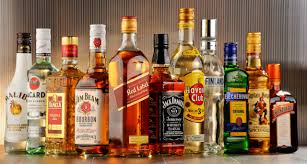-By LeN Investigations Editor

(Lanka-e-News -10.Nov.2025, 4.00 PM) Sri Lanka’s alcohol importation business, long cloaked in political favouritism and bureaucratic opacity, appears once again to be tangled in a web of privilege and selective enforcement. Records obtained by The Lanka E News reveal that several importation licences originally granted during the tenure of the late Finance Minister Mangala Samaraweera remain active — despite being tied to companies and individuals no longer engaged in legitimate trade.
At the heart of the matter is a man, a close associate of the late minister, who reportedly runs a lifestyle and media website projecting himself as an industry thought leader. Behind that digital façade, however, lies an entirely different enterprise — one involving the quiet control of multiple alcohol importation licences issued under the former administration.
During Mr Samaraweera’s tenure at the Finance Ministry, select individuals were awarded exclusive alcohol importation rights. Those licences, according to officials familiar with the process, were distributed with minimal transparency and have since been used as vehicles for private profit rather than for legitimate distribution.
What makes this more alarming is that these licences remain valid to date, despite the apparent inactivity of the original firms. In some cases, sources allege that the holders have allowed third-party importers to operate under their licence privileges — a practice that, if true, amounts to regulatory evasion and an outright abuse of public trust.
The controversy deepens when one revisits the regulatory architecture introduced by another former finance minister, Ravi Karunanayake. It was during his period that the alcohol importation licence system was formalised, purportedly to bring order to the sector. In practice, it did quite the opposite.
Critics argue that the system effectively handed monopoly-like control to a few politically connected players — most notably those linked to Lion Brewery and other major distributors. Instead of fostering competition or increasing tax revenue, the licensing scheme allegedly created an artificial bottleneck, ensuring that only favoured businessmen could access import channels.
Economists and trade experts have since questioned the rationale behind such a licensing regime. Alcohol imports, after all, are subject to customs duties and excise stickers — already heavily regulated mechanisms ensuring both revenue collection and traceability. The existence of a separate importation licence layer serves little regulatory purpose other than to centralise control.
Mr Karunanayake’s own record does little to inspire confidence. Having once resigned amid allegations of financial misconduct over the purchase of a luxury apartment in Colombo, the former finance minister’s return to the public spotlight — now as a member of the Committee on Public Finance — has sparked widespread criticism.
“Someone who has lost moral and ethical credibility to manage public funds cannot be entrusted to oversee others,” said a former Auditor General who spoke on condition of anonymity. “It undermines the integrity of Parliament and the credibility of financial oversight itself.”
Mr Karunanayake’s defence — that the apartment was purchased by a company director abroad — has never been substantiated by any official record of foreign remittance. If, as claimed, the funds were brought physically into Sri Lanka, they would have had to be declared at customs — yet no such declaration exists.
The emerging picture is one of systemic corruption disguised as regulatory reform. The licence regime, created ostensibly to monitor imports, instead served as a conduit for political patronage. Licences were handed out selectively, often to associates, relatives, and loyalists, who then used them as rent-seeking instruments in a lucrative market.
In the case of Mangala's close associate, questions abound as to how a media entrepreneur came to possess — and retain — multiple alcohol import permits. If these licences are being sublet or used by proxy for third-party imports, as insiders suggest, it would constitute a violation of Sri Lanka’s excise laws.
As Sri Lanka’s new administration under the National People’s Power (NPP) promises a sweeping anti-corruption drive, the status of these dormant but lucrative licences provides a critical test of political will.
If the government is serious about ending entrenched cronyism, it must initiate a forensic audit of all alcohol importation licences issued over the past decade — tracing their beneficiaries, actual operations, and financial disclosures.
Moreover, if the website run by Mangala's close associate or others has been used as a front for the import business, that too should be examined under Sri Lankan cyber and financial law. Using another person’s name or business registration to mask financial activities constitutes an offence under existing statutes.
The issue is not just about one man or one licence. It reflects a culture where political privilege and commercial power are indistinguishable — where state mechanisms designed to regulate instead become instruments of enrichment.
The Finance Ministry and the Excise Department now face a moral imperative: either dismantle the opaque licensing structure or open it transparently to all qualified importers. Until then, the question remains — why does Sri Lanka, a country struggling with debt, continue to protect a few privileged middlemen in one of its most profitable industries?
-By LeN Investigations Editor
---------------------------
by (2025-11-10 11:17:06)
Leave a Reply